How was a 21-year-old gamer able to leak a mountain of major Pentagon secrets?
Barely three years into his military career, Jack Teixeira allegedly exposed his country’s most sensitive intelligence gathering operations. Now the Pentagon is being forced into a reckoning on who should have access to America’s secrets. Bevan Hurley reports

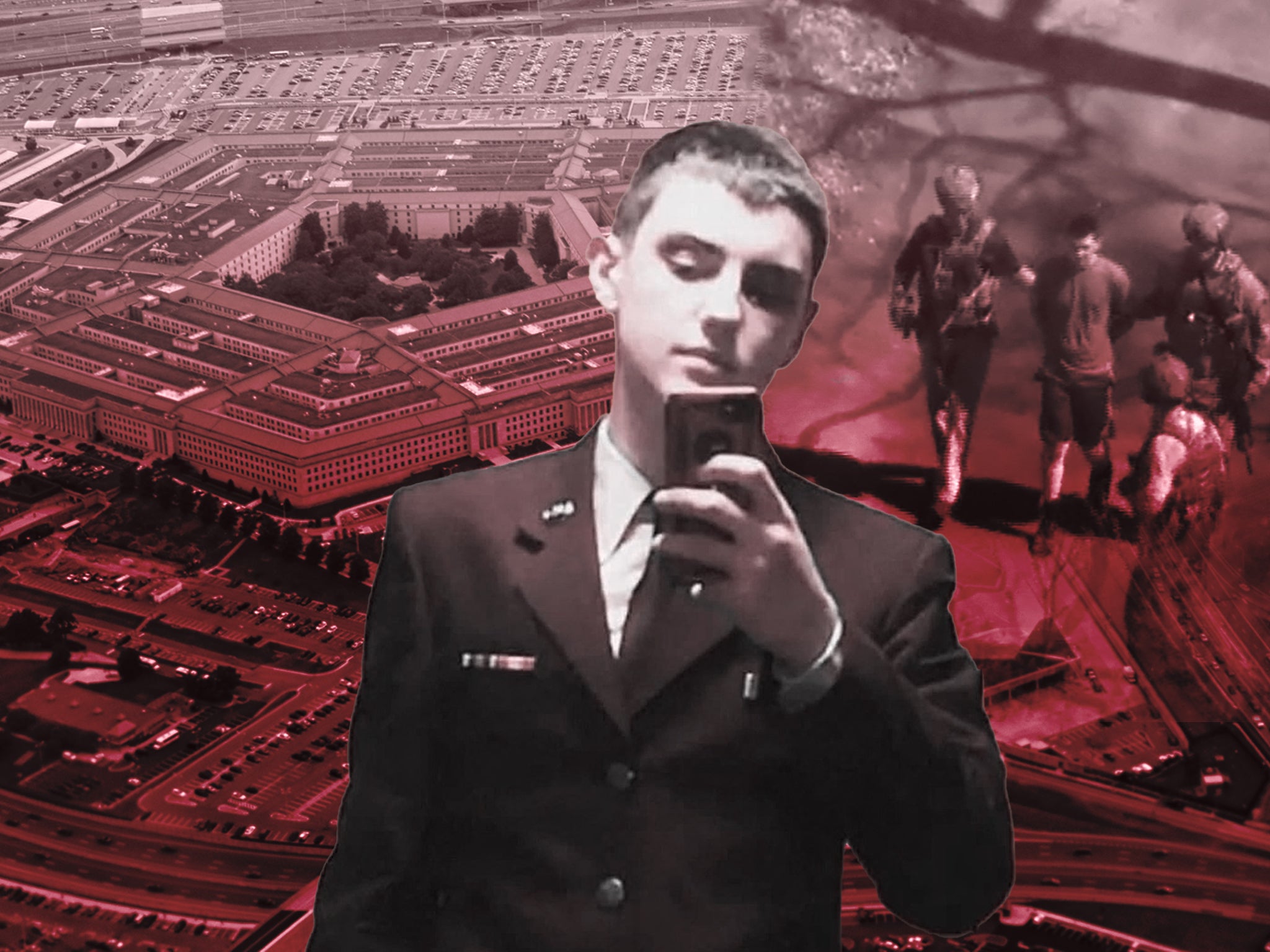
Your support helps us to tell the story
From reproductive rights to climate change to Big Tech, The Independent is on the ground when the story is developing. Whether it's investigating the financials of Elon Musk's pro-Trump PAC or producing our latest documentary, 'The A Word', which shines a light on the American women fighting for reproductive rights, we know how important it is to parse out the facts from the messaging.
At such a critical moment in US history, we need reporters on the ground. Your donation allows us to keep sending journalists to speak to both sides of the story.
The Independent is trusted by Americans across the entire political spectrum. And unlike many other quality news outlets, we choose not to lock Americans out of our reporting and analysis with paywalls. We believe quality journalism should be available to everyone, paid for by those who can afford it.
Your support makes all the difference.Handcuffed and with his legs in shackles, Jack Douglas Teixeira glanced nervously around a crowded Boston courtroom during his first court appearance in April.
The 21-year-old Massachusetts National Guard airman whispered “yes” when informed of his rights as a criminal defendant, according to CNN, showing no hint of the swagger of his online persona OG.
As the hearing concluded, a man in the public gallery shouted: “Love you, Jack.” Without looking back, Teixeira replied: “You too, Dad”.
On Thursday, 15 June, the low-level IT worker was indicted by a grand jury on six counts of willful retention and transmission of classified information relating to the national defence.
Prosecutors allege that Teixeira, while caught up in the braggadocio culture of online gaming, shared hundreds of classified documents on a Discord chat server in the biggest leak of US intelligence data in a decade.
Despite his low-level rank as a “cyber systems journeyman” with the National Guard, he has held top secret security clearance since 2021, according to charging documents unsealed in April.
The clearance afforded him access to top-secret reports about the whereabouts and movements of high-ranking political leaders and tactical updates on the military forces of friends and foes alike.
Federal investigators allege Teixeira began copying and sharing classified reports in December on a private Discord chat group with a cabal of 20 to 30 young men and teenagers, who had come together during the pandemic through a shared interest in guns, God, and gaming.
By January, he was allegedly taking photographs of military maps and charts, and briefing documents. Some showed weaknesses in Ukraine’s air defence systems and supply lines, others contained politically-sensitive intelligence on allies such as Israel and Egypt.

Around 30 classified documents were then posted on a public Discord chat group in early March, according to Bellingcat, before finding their way onto Russian Telegram channels.
US military officials were blindsided by the spread of top secret information and did not become aware until the week before his arrest that secrets had been spreading online for months, leaving the Pentagon scrambling to try to work out the source of the leak, according to reports.
The information risked exposing US sources and methods of intelligence gathering, in particular with the war in Ukraine, military analysts say.
It revealed that the Pentagon knew a lot about what the Russians were going to do before they did it, and had seemingly penetrated the top ranks of their military intelligence unit, the GRU.
One leaked document from February was titled “Russia-Ukraine: Battle for the Donbas Region Likely Heading for a Stalemate Throughout 2023.” It notes the challenges with assessing the “endurance of Ukraine’s operations.”
Military experts say the leak has exposed an inherent weakness at the heart of US intelligence gathering.
With an estimated 1.25 million US citizens holding top secret clearance, the sheer number of people with access to the nation’s secrets makes it almost impossible to properly vet and monitor every individual.
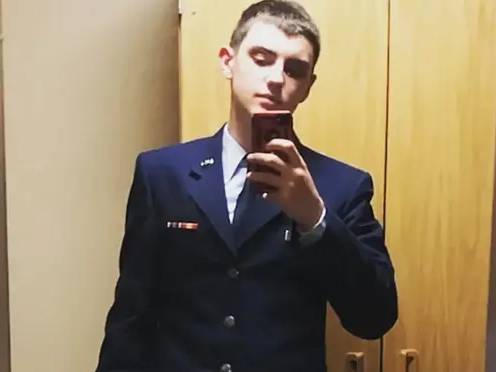
This appears to have been exposed in spectacular fashion through one individual’s narcissism, experts say.
“The desire for ‘fame’ by the leader who is among a group of young gamers is unfathomable,” retired US Lieutenant General and military analyst Mark Hertling wrote on Twitter. “God help our country.”
It’s also forced the US government to hold a reckoning on who should receive top secret clearance, and how they are vetted.
“The Department has taken steps to further restrict access to relevant documents,” Pentagon spokesperson Sue Gough told The Independent in a statement.
“We periodically review our distribution lists for personnel who receive such information to ensure that these recipients still have a valid need to know the information, as the distribution lists often grow over time. We are taking this opportunity to review many of our distribution lists now.”

Air Force Brigadier General Pat Ryder, the Pentagon press secretary, effectively admitted during a press conference that officials still don’t know how many classified documents were out there.
He described the leak as a “deliberate, criminal act”.
US Defense Secretary Lloyd Austin emphasised in a statement that access to top secret materials would likely be tightened as a result of the leak.
Mr Austin added that he would “not hesitate to take any additional measures necessary to safeguard our nation’s secrets”.
“Every US service member, (Department of Defense) civilian and contractor with access to classified information has a solemn legal and moral obligation to safeguard it and to report any suspicious activity or behaviour,” he said.
The leaked documents present a “very serious risk to national security,” a Pentagon spokesman said during a briefing on Monday.
President Joe Biden has publicly played down the significance of the risk to American assets around the world, saying during a state visit to Ireland in April that he wasn't “concerned” because the leaked information was not “contemporaneous”.
US intelligence agencies receive $90bn in annual funding, and have sweeping powers to tap electronic communications, run spies and monitor the precise movements of its enemies and allies via satellites.
The results are seldom seen in public view.
The nation’s diplomats have reportedly been in damage control to calm relations with some of their most important allies.
The leak has also left the US’s partners in the Five Eyes intelligence-sharing community, the United Kingdom, Canada, Australia and New Zealand, scrambling for answers.
“We expect the US to share a damage assessment with us in the coming days, but we cannot wait for their assessment. Right now we are doing our own,” one official from a Five Eyes member country told CNN.
How the Pentagon leaks unfolded
Among his group of friends on Discord, Jack Teixeira had a reputation as someone with an uncanny knack for knowing about major events before they appeared in the news.
The Thug Shaker Central chat group was formed by a group of isolated gamers during Covid-19 lockdowns of 2020, with the young men drawn together by a shared interest in Christianity and guns, one member told the Washington Post.
Among the group of about two dozen teenagers and young men, Teixeira was known by his handle OG and was the informal leader. Elsewhere, he posted under the names “jackthedripper” and “excalibureffect,” and would occasionally share racist memes, members of the group chat say.
Amid the bombastic culture common among online gamers, Teixeira’s secret insights into the upper echelons of US government impressed his young circle.
He told the group that he worked on a military base, and would spend hours taking handwritten notes of the classified information.
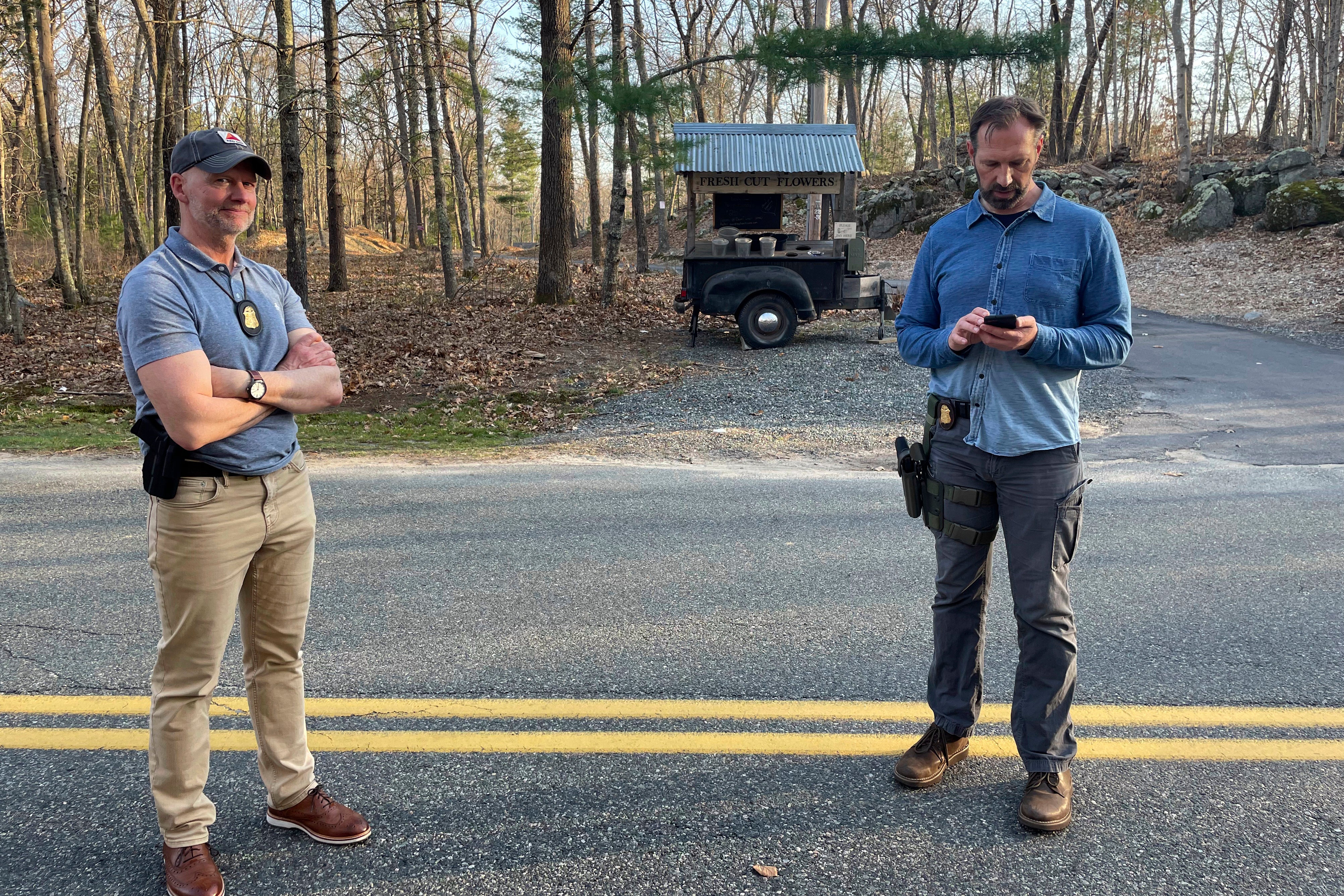
He “lectured them about world affairs and secretive government operations” as they watched movies and prayed together, one told the Washington Post.
He had wanted to “keep us in the loop”, and thought that the secrets would be shielded from the outside world inside the private chat group that he controlled, the member said.
But he appeared unsatisfied with the level of interest others showed toward his knowledge of intelligence acronyms such as NOFORN, meaning not to be shown to foreigners.
So Teixeira allegedly began taking greater risks. According to accounts of those in the chat group, he began posting photographs of crumpled copies of top secret briefing documents.
The greater degree of risk taking seemed to excite the young military man, members of the group have said.
After the leaked documents, some of which had been doctored, began appearing on Russian Telegram channels, the Pentagon finally leapt into action.
Investigators soon narrowed down the search for the source of the leak to members of Teixeira’s chat group, and traced him using Discord payments, an initial charging document stated.
Teixeira was then publicly identified by The New York Times on the day of his arrest.
He sent a final message to members of the group. “Only God can decide what happens from now on,” he said, a friend told the Times. “Guys, it’s been good. I love you all.”
On 13 April, Teixeira was seen in aerial footage reading a book on his porch as an armoured vehicle made its way up the driveway of the home he shared with his mother Dawn, a florist, in North Dighton, Massachusetts.
Heavily-armed FBI agents in tactical gear then moved in to arrest Teixeira.
He had reportedly been under FBI surveillance for several days, but his unmasking by news sites prior to his arrest was a further embarrassment to law enforcement officials.
At a brief press conference announcing the arrest, Attorney General Merrick Garland suggested the suspect was motivated by a sense of bravado rather than ideology.
In a statement announcing Teixeira’s indictment: acting US Attorney Joshua S. Levy said: “The unauthorized removal, retention and transmission of classified information jeopardizes our nation’s security.”
Teixeira faces up to 10 years in prison and a fine of $250,000 if convicted.
Who should have access to the nation’s top secrets?
The most recent figures on the number of people with top secret clearance are from the Office of the Director of National Intelligence in 2019.
Of the more than 1.25 million with clearance, around 605,000 are Government employees, 472,000 are contractors, and 173,000 are placed under a category of “other”.
Receiving a top security clearance is far from a fait accompli.
In 2019, it was revealed that Donald Trump’s son-in-law Jared Kushner had been rejected for top-secret clearance by two senior officials. The then-senior White House adviser eventually received his clearance after an intervention by the former president .
Experts believe that warning signs about the Teixeira’s temperament may have been missed during his clearance process.
Paul Lushenko, the Deputy Director of Cornell’s Tech Policy Institute, told CBS News that anyone receiving top secret clearance would have to go through a “fairly rigorous background check”.
“This person obviously did well in that interview. But between that and this episode or episodes of breaching something went awry,” he said.
Military records show he enlisted in 2019 as a cyber transport systems specialist. Teixeira had an E-3 ranking, a junior position reflecting his short stint in the military.
Last year, he graduated to an Airman 1st Class in the Guard’s 102nd Intelligence Wing, in the same unit his stepfather Thomas Dufault had served in for 34 years, according to The Post.
Friends told CNN that Teixeira described him as a loner who held a longstanding fascination with the military.
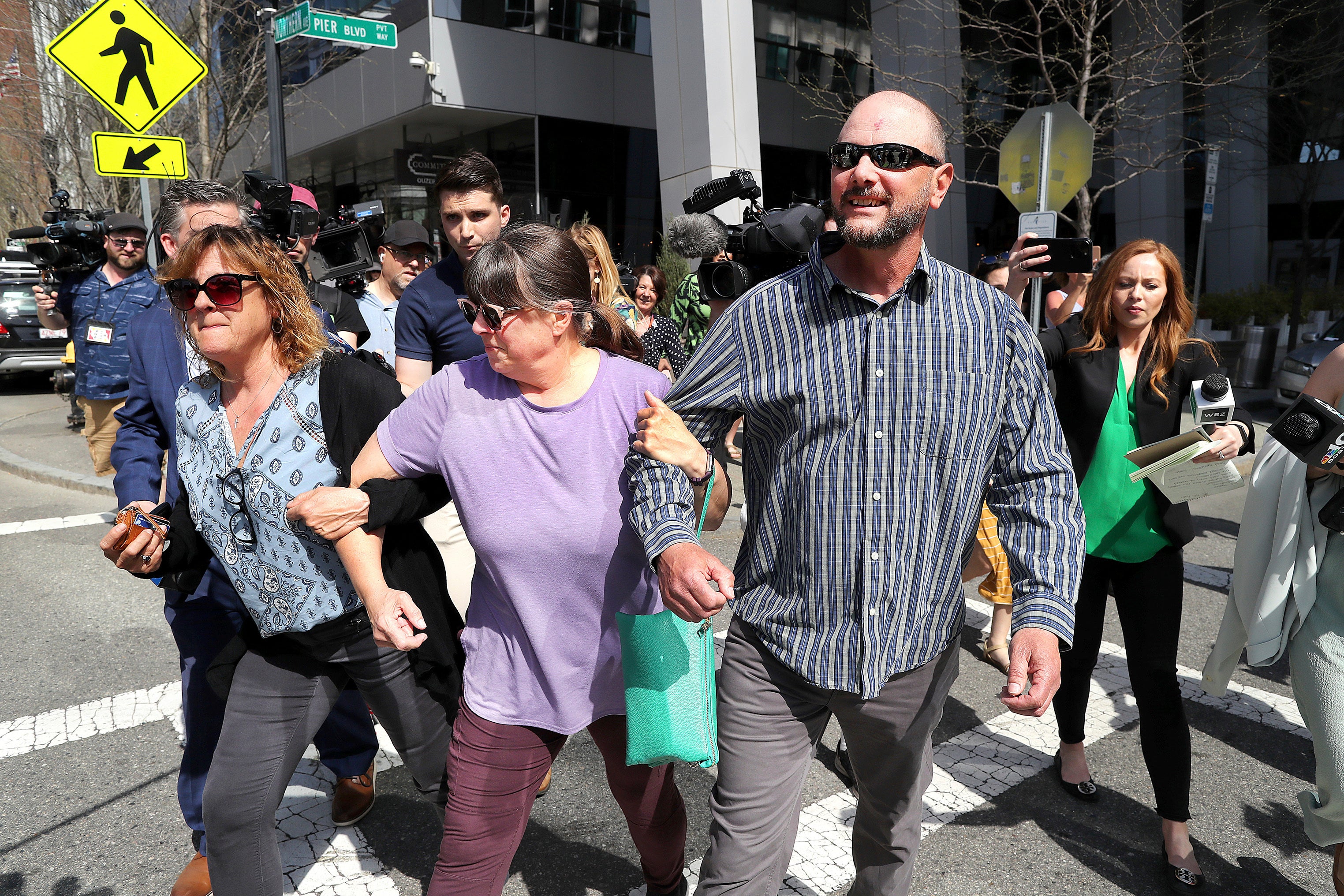
John Powell, a classmate from high school, said Teixeira used to carry around textbooks about military vehicles including tanks, planes and submarines.
Mr Powell told the network that his friend was interested in anything “military-related” from a tender age.
“He was dead set on joining some branch of the military, even as a kid,” he said.
Members of his Discord group rejected claims that Teixeira saw himself as a whistle-blower akin to Edward Snowden.
“This guy was a Christian, antiwar, just wanted to inform some of his friends about what’s going on,” a 17-year-old member known as Vahki told the New York Times in an interview.
“He was the man, the myth. And he was the legend. Everyone respected this guy.”
From Putin’s chemo treament to Ukraine’s battlefield capabilities
The leak has exposed hundreds of sensitive intelligence gathering operations.
These included a plan by Egypt, which receives $1.3bn in American military aid each year, to sell rockets and munition to Moscow.
The Egyptian president Abdel Fattah al-Sisi reportedly instructed officials to keep production and shipment secret “to avoid problems with the West”, according to the Associated Press.
They also pointed to Ukrainian casualty figures being far higher than publicly stated by Kyiv, and that Ukrainian air defences were running out of munitions.
There were additional claims that UK special forces may be operating in Ukraine.
The leaked documents also suggest that Russian President Vladimir Putin may be undergoing chemotherapy.


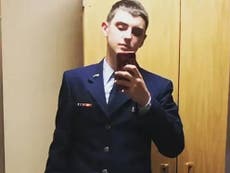
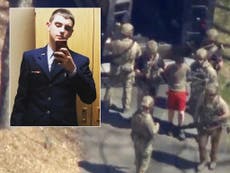
Join our commenting forum
Join thought-provoking conversations, follow other Independent readers and see their replies
Comments